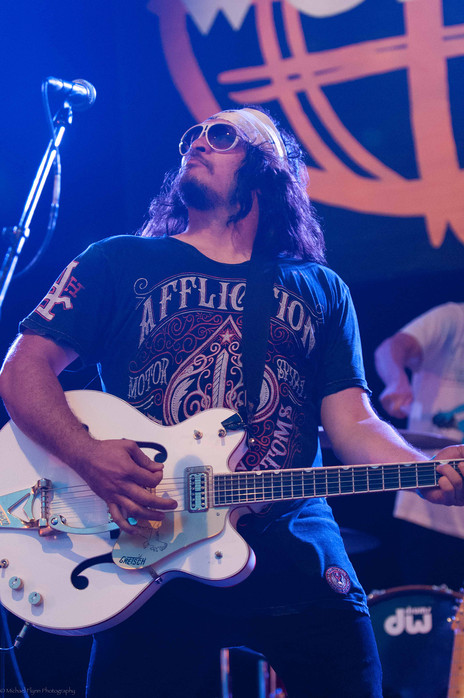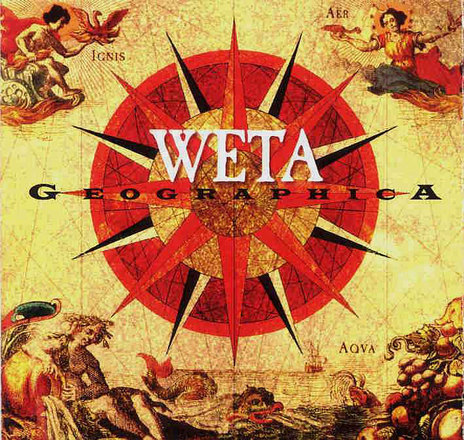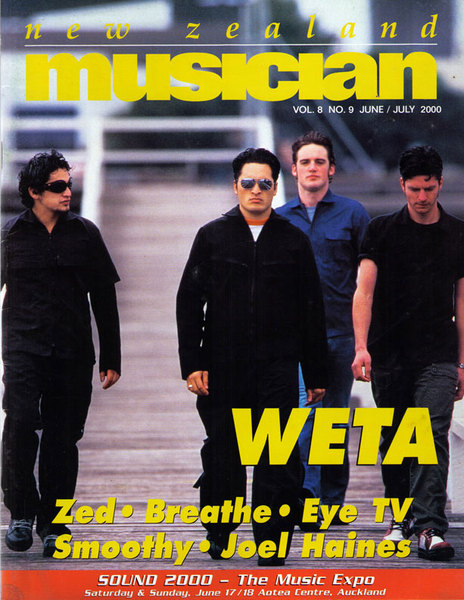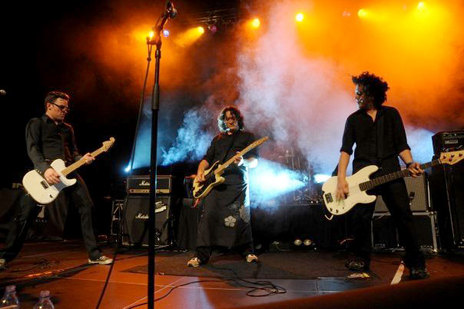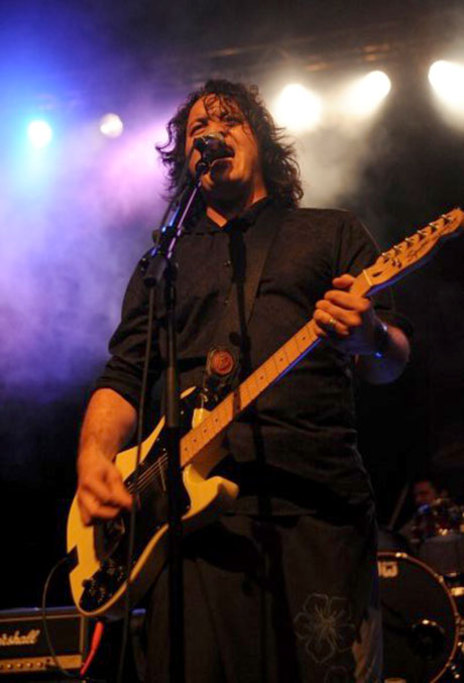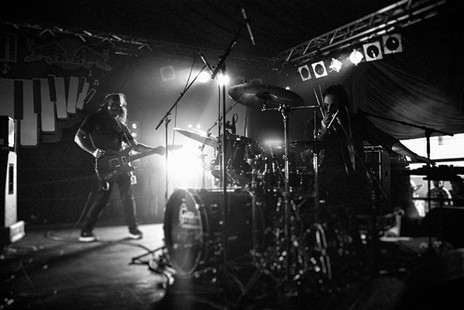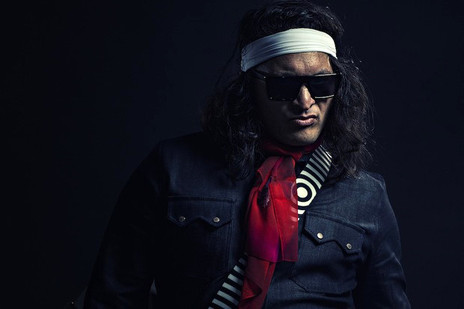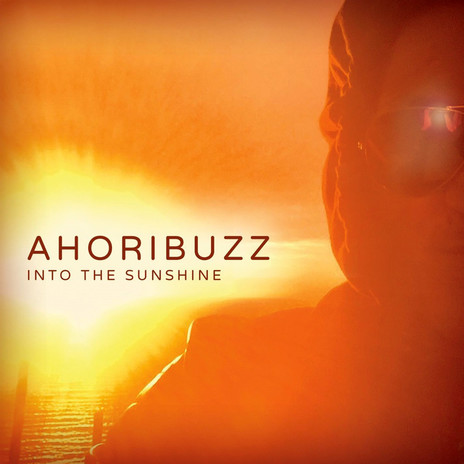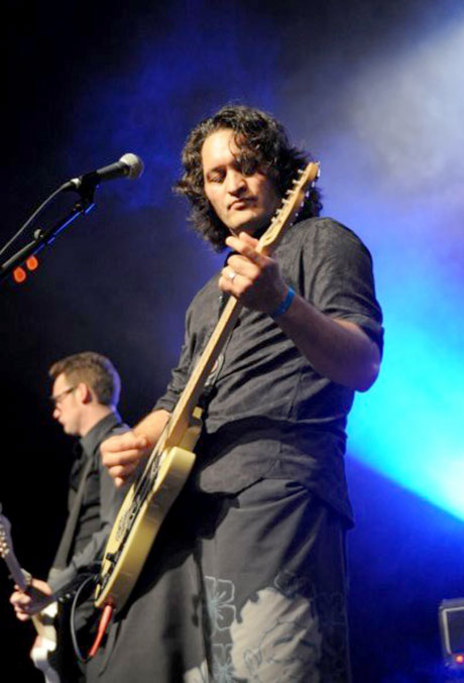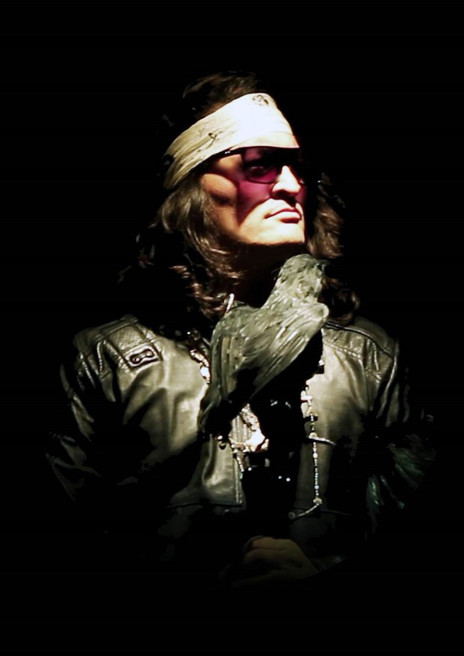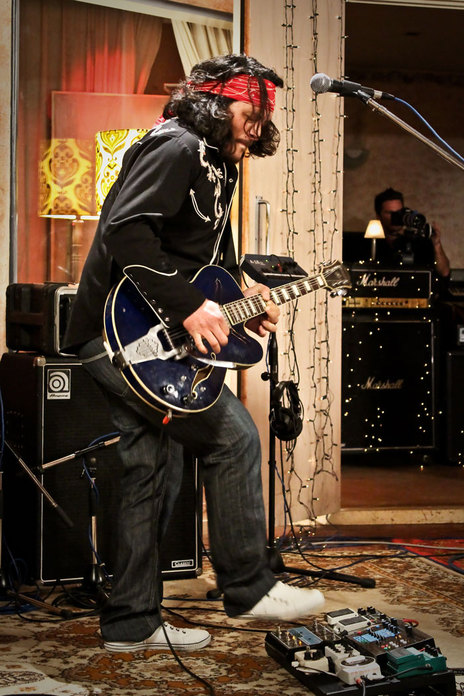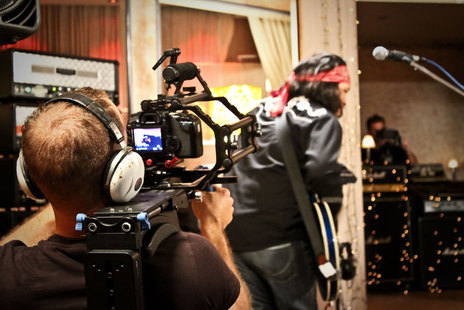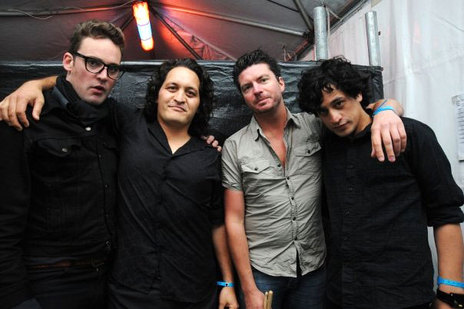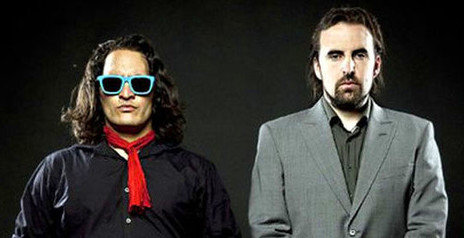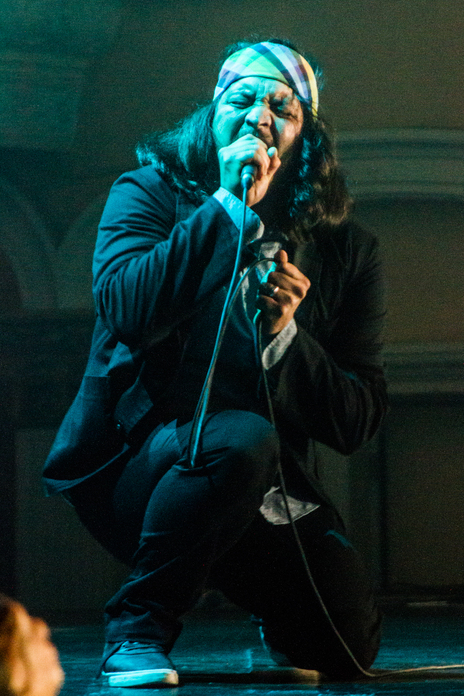As a youngster, he turned up his guitar when it might not have seemed like such a good idea: his Taita College school prize-giving was treated to a screeching Van Halen solo after he got bored with the John Williams classical piece he was meant to be playing. He said it got him kicked out of school.
He turned up in lots of other places, like the Smokefreerockquest where he won a musicianship award with his school band Pride and Joy.
He was a guitar-obsessed kid. “My wall was full of Jimi Hendrix and Steve Vai posters,” he told The Nutters Club radio show. “I would wake up at four o'clock every morning, practice for a few hours before going to school and then get home and do it again all night ... I was away with the muso fairies for quite a long time, which was a good place for me to be.”
His dad, who was raising Tokona and his brothers on the domestic purposes benefit, dressed him up and sent him out busking.
“I was the richest broke kid at school ... my pocket would be full of coins. This kind of probably explains why I was a fat chubby kid: ‘Want to go to the tuck-shop dude? Let's go. Put it on me, mate’. A regular little Snoop Dogg.”
He did his time in Wellington cover bands then in 1995 formed Weta, the band that would first bring him to wider attention but which foundered soon after a classic debut album.
In the late 2000s, having acquired the Hendrix-ian headscarf that would become his trademark, Tokona formed the loop-adelic drum-guitar-duo Cairo Knife Fight with Nick Gaffaney, guested with the folk-funk fusion of Fly My Pretties, and established his own soul-rock-whatever outfit AHoriBuzz.
Along the way, Tokona turned up in studios to play on records by everyone from Marlon Williams, to Fat Freddy’s Drop and its dub-funk precursor Bongmaster, to Fiona McDonald to The Eastern to Kim Dotcom.
Tokona played on recordings by Marlon Williams, Fat Freddy’s Drop, Fiona McDonald, The Eastern – and Kim Dotcom.
His candid and extensive Facebook posts about his involvement in the internet kingpin Dotcom’s album Good Times added both to the project’s legend as a rich man’s folly and to Tokona’s own reputation as a man who spoke his mind, however troubled.
He turned up too, not just on other people’s songs but in them. Jon Toogood partly addressed Shihad’s song ‘Pacifier’ to Tokona, who had been a Melbourne flatmate, after witnessing his manic-depressive swings: “You feeling good today/ ’Cause I got told that you were/ Smashed up on your own motorway …”
Tokona’s bipolar condition led to him giving up music for much of the early 2000s. After he returned to performing and recording, he frequently talked frankly about it.
“I'm very public about my mental illness – a lot of people seem to fear it or be confused by it, but it's just a release and a relief for me,” he told the NZ Herald’s Lydia Jenkin in 2015.
“I discovered one day that if I owned it, and spoke about it, I felt free of it in a lot of ways. I suppose it's easy for me, because I don't really care what people think.”
Fans at Cairo Knife Fight and AHoriBuzz gigs, he said, would often seek him out afterwards or on Facebook to talk. He took that as a sign that being up-front was a good thing.
Tokona’s mental health issues came to a head in his early 20s just as Weta was gathering momentum. The band had signed to Warners Australia, a deal which delivered 1999 EP Natural Compression (produced by Shihad’s Tom Larkin) and 2000 album Geographica.
It might have been a debut album by a band whose frontman adored the fretboard pyrotechnics of Eddie Van Halen, Steve Vai and Hendrix. But on Geographica, Tokona restrained the old-school guitar heroics for a set that was muscular and melodic, a mix of explosive riffery and dramatic texture.
It echoed Shihad in some places and other 90s rock touchstones like Soundgarden and Radiohead in others. It also suggested – as did their live performances – they could well be Next Big Things on both sides of the Tasman.
But Weta’s final show was in Nelson at the end of November 2000 on a tour with fellow Wellington-bred Melbourne-exiles Shihad and Fur Patrol. The album had been out in New Zealand for two months. Tokona had already decided to call it quits due to the stress he was under as the band’s momentum and touring commitments grew.
He had suffered another depressive episode a few years earlier when he was a musical director of an New Zealand Festival of the Arts show. Performing as L.A.G.O, with musical mate Iain Gordon (aka Dobie Blaze of Fat Freddy’s), the pressure of leading a cast and crew of 50 in a show mixing opera and beats flattened him.
Tokona often joked that being bipolar could be fun: “You're Stevie Wonder one day and Jimi Hendrix the next.”
“I didn’t have the experience of life to really help me through the situation. So I came crashing, smashing into a wall,” he told RNZ’s Kim Hill in 2015. “I kind of think that really started a mental decline for me. I don't know whether it initiated it or what.”
Tokona often joked that the manic highs of his condition could be fun: “You're Stevie Wonder one day and Jimi Hendrix the next.”
But his lows could be devastating and long. Since returning to music in 2008 he had, with support, learned to manage himself.
Post-Weta and with the bipolar diagnosis, Tokona shifted to Christchurch with his wife and daughter. He started working in construction and in his in-laws’ entertainment-park business.
It was a more stable lifestyle but an occasionally embarrassing one. He found himself unable to convince workmates that was him when a Weta song came on the building site radio. He then donned a Stetson in his job running a Wild West-themed mini-golf park.
“My friends from the music industry would show up,“ he told Hill. “One day Hollie Smith would show up and then I think TrinityRoots would show up and there I was, a gun-slinging putter-rolling cowboy guy who used to be in a band called Weta.”
He started thinking about music again. He bought himself a guitar. He got a call to come play a show in Auckland – playing Hendrix covers in a band with members of Pluto at the leaving party of EMI NZ’s boss Chris Caddick. After playing ‘Purple Haze’, ‘Little Wing’ and ‘Third Stone from the Sun’ (but apparently not ‘Manic Depression’) in front of a jubilant music industry audience, Tokona decided perhaps his time in the mini-golf business was coming to an end.
“That was really the one that ignited my decision to go off and be that crazy Māori music guy again.”
Back in Christchurch he had encountered the beginnings of the city’s Lyttelton-centred alt-country movement. “I remember thinking to myself ‘Wow this town has start turning into this fucking hillbilly folk music town.”
He embraced it slightly, he told Lewis Tennant of the Verbal Highs podcast, by playing some small gigs in a covers duo with a young Marlon Williams who he’d first met when the singer was still in school uniform. He would later play all the guitars on ‘Hello Miss Lonesome’, the lead track off Williams’s self-titled 2015 debut solo album.
Tokona also found an outlet for his rockier side in Cairo Knife Fight, his duo with drumming multi-instrumentalist Nick Gaffaney, a partnership which lasted through the group’s debut album Iron and early EPs. They confounded many by how much noise just two blokes could deliver.
“You had two guys on loop pedals, and this freak on drums that loops himself and then plays bass at the same time.” Tokona told NZ Musician. “So I kind of got into this, ‘I’m gonna go wage war’ mentality ... to musically wage war against that guy, and that band and that get-up.”
The pair parted company after a few years. “There was no acrimony, there never was, it’s just circumstances,” said Gaffaney who carried on with new partners.
TOKONA EMBRACED HIS PSYCHEDELIC FUNK SIDE IN AHORIBUZZ; HE DIDN’T SEE THE NAME AS A PROBLEM.
Meanwhile, Tokona was roped into the Fly My Pretties collective for a tour and the resulting album/DVD Fly My Pretties IV which featured Tokona’s ‘Turnaround’, an epic song that suggested he could be Stevie Wonder and Jimi Hendrix in the same song.
Tokona (Ngāi Te Rangi, Ngāti Maniapoto) would further embrace his psychedelic funk side in AHoriBuzz, band with himself at the centre and a name that he didn’t see as a problem.
The group started as a jam band and evolved into a recording one with his Into the Sunshine double EP of five songs and remixes featuring members of Fat Freddy’s Drop, Kora, Hollie Smith, Anika Moa, Ladi6, and Anna Coddington, among others. “The phrase is, ‘Oh, you bloody Hori’, which to me has always been about describing the uniqueness of the Māori sense of humour,” he told RNZ’s Music 101. “It didn’t actually truthfully occur to me that it had racial ramifications about it until someone pointed it out to me, because I don’t live in that space.”
The record now marks the end of a rollercoaster music career, if only that didn’t suggest it had actually stayed on the rails through all its ups and downs. With that guitar, Aaron Tokona left a remarkable legacy. With that laugh and his candour, he endeared himself to many.
